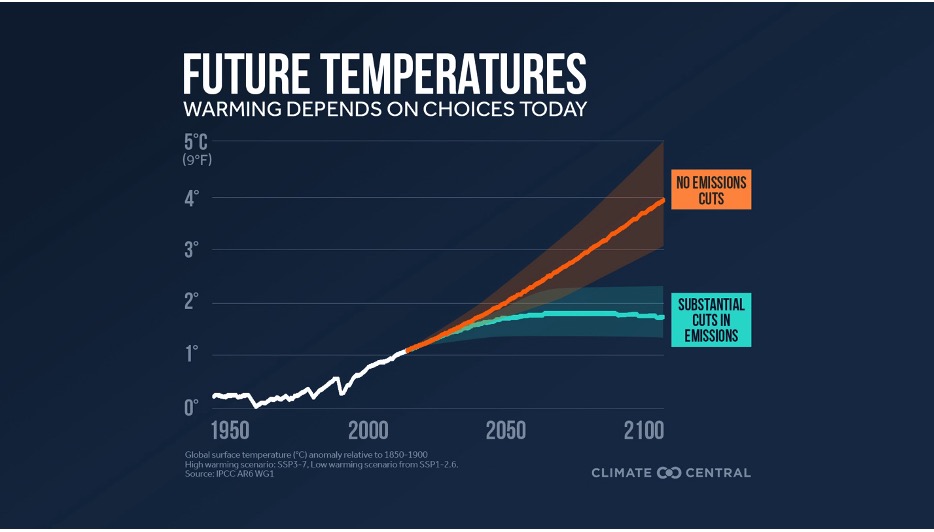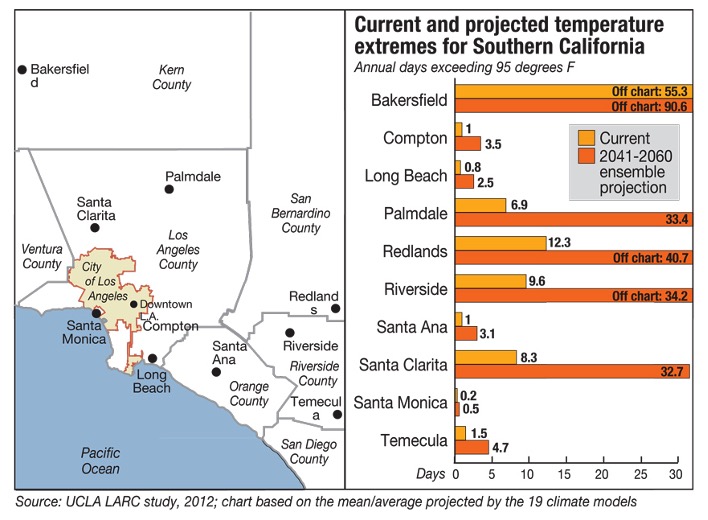Comments
PLANNING WATCH - Recent headlines are clear. Climate change has arrived, and severe storms and record heat are the new normal.
CNN: “Hurricanes are intensifying faster than ever due to climate change”
New York Times: “Climate change is speeding towards catastrophe”
UN: “Hottest July ever signals era of global boiling has arrived”
ABC: “2024 on track to become earth's warmest year on record”

Without substantial cuts in Greenhouse Gas emissions -- the inevitable by-product of burning fossil fuels -- by 2100 average temperatures will have increased 4 degrees Centigrade (6.4 degrees Fahrenheit).
In California, including Los Angeles, climate change is well documented. According to the Los Angeles Times:
“Indicators of Climate Change in California" (A 650 page State study released 2022) paints a stark picture of California’s escalating climate crisis. It also documents how global reliance on fossil fuels has had wide-ranging effects on the state’s weather and residents. Since the last update in 2018, weather extremes have intensified and become more erratic. Human health indicators, such as heat-related illness, Valley Fever, and wildfire smoke have gotten worse. Some of the changes are irreversible.
In light of these trends, how successful has Los Angeles been in monitoring local climate change indicators, like forecast temperature increases. and then implementing adaptation and mitigation programs to counter them?

A closer look at LA’s City Hall reveals near total failure in implementing climate change policies and programs, including monitoring. For example, every California city and county must adopt a Climate Justice General Plan element, yet Los Angeles has not yet decided on a start date for its Climate Justice plan.
LA’s General Plan also does not contain an optional Climate Change element, despite the Governor’s Office of Planning and Research posting a template for it.
What other climate change documents are available at LA’s City Hall?
In 2015 former Mayor Eric Garcetti unveiled a 108 page executive document: the Sustainable City pLAn, which is still on the City’s website.
Eric Garcetti also posted a second climate plan, LA’s Green New Deal, in 2019. It, too, remains on the City’s website. But I can’t find evidence that Mayor Karen Bass has adopted or amended either climate document. Do we even know if they are still valid, since LA’s City Council never considered them, and Eric Garcetti is now the U.S. Ambassador to India?
In December 2023, Mayor Bass issued a press release listing several municipal climate programs, including Federal and State grants for renewable hydrogen, electric grid flexibility, and turf replacement. How these programs meet the goals of LA’s Green New Deal remains unknown.
LA’s Department of Public Works contains a small unit with an impressive name, the Climate Emergency Mobilization Office. It largely addresses heat issues. City Hall also has a Climate Emergency Mobilization Commission, which advises the Mayor and City Council on climate issues. The Commission’s July 2024 minutes mention a Los Angeles Climate Action and Adaptation Plan (CAAP). So far, I have not been able to locate it.
Unsolicited Advice: We know there is no lack of suggestions on how City Hall should address climate change. For example, a December 2022 Los Angeles Times editorial offered LA’s new mayor five climate actions:
- Set benchmarks and demand that City departments meet goals regarding tree planting, curbside composting, and zero-carbon electricity.
- Slash port pollution.
- Appoint people with a track record of supporting clean air, climate change mitigation, and environmental initiatives.
- Ban new oil and gas drilling.
- Require new buildings to be fully electric
In 2015 the nonprofit Climate Resolve prepared: Living Streets – A Guide for Los Angeles. It detailed how Los Angeles should build green, cool, and complete streets.
UCLA hosts the Los Angeles Regional Collaborative for Climate Action and Sustainability (LARC). It proposed many climate change programs in its 2016 Greater LA Climate Action Framework. This detailed report carefully inventoried proposed climate programs for Los Angeles. The report concludes: “Local leaders must demonstrate the will to translate these recommendations into action, in order to ensure that Los Angeles can transition to a resilient, healthy, carbon-free, and thriving metropolis for the next century and beyond.”
What LARC wrote in 2016 is still relevant. The ball remains in City Hall’s court.
(Dick Platkin is a retired LA city planner who reports on planning issues for CityWatchLA. He is a board member of United Neighborhoods for Los Angeles (UN4LA). Previous Planning Watch columns are available at the CityWatchLA archives. Please send questions to [email protected] .)
















